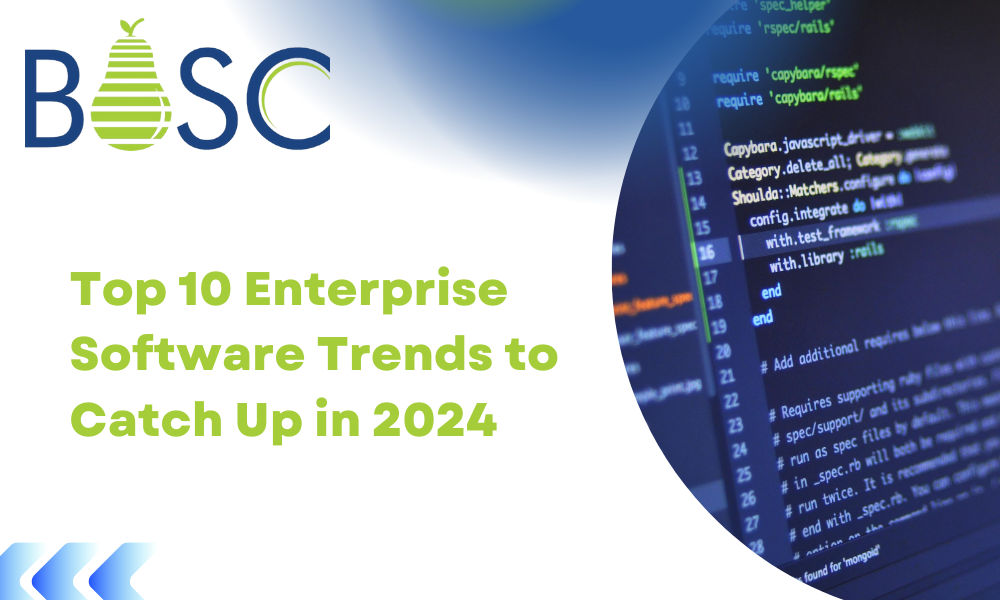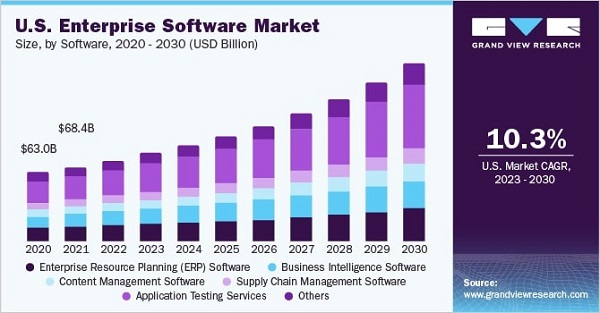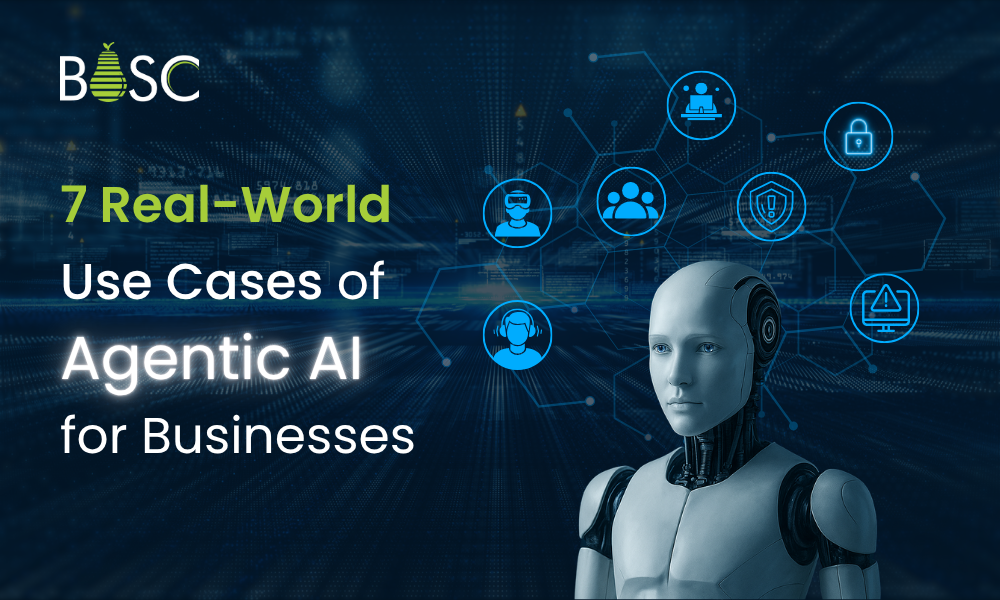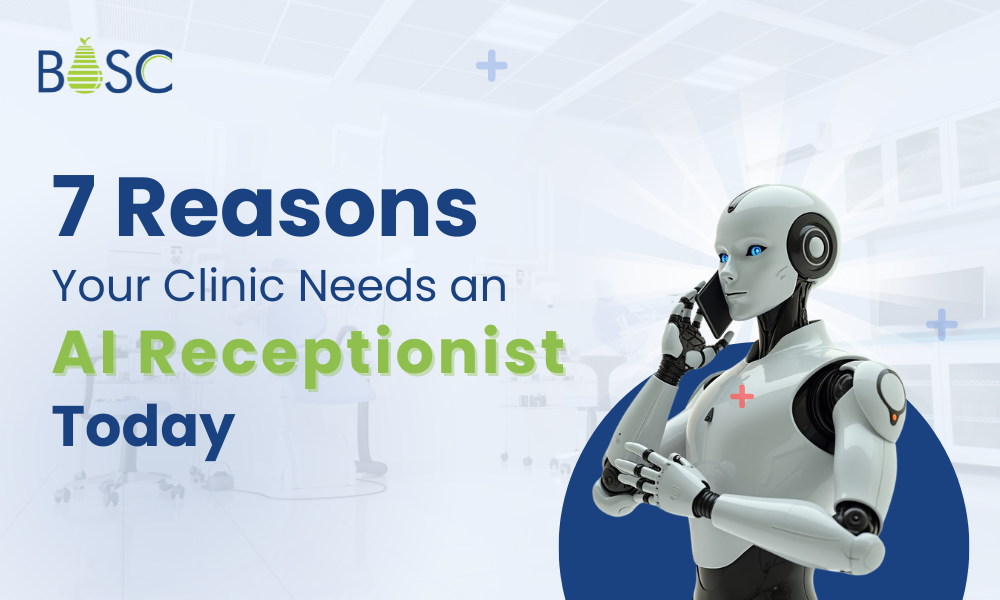Many opportunities for companies and organizations looking to progress their business activities have been made available because of innovations in the enterprise software industry. Making informed decisions, identifying opportunities for innovation, and staying ahead of the curve can all be made easier for your company if you stay up with the evolving future trends of enterprise software. Business owners will benefit from being aware of enterprise application trends as they can better match their strategy and investment choices with changing customer and market demands. To help you get insight into the upcoming trends in enterprise applications and align your company strategy appropriately, we’ll go through some of the most critical enterprise software trends in this blog article and look at the future of enterprise software.
Introduction
Many enterprises have migrated to the cloud and the Software as a Service (SaaS) model, which has caused the enterprise software industry to expand significantly over the past few years. Deploying new technologies and making informed decisions are made simple and swiftly by utilizing Artificial Intelligence (AI) models, Microservices, and Application Programming Interfaces (APIs). For the overall success of a business or organization, it is crucial to recognize the future opportunities of enterprise application as technology continues to grow at an unprecedented pace.
Enterprise Software Market Size
The market for enterprise software was estimated at USD 216.69 billion in 2022, and from 2024 to 2030, it is anticipated to increase at a CAGR of 11.5%. The increase in spending by end-use businesses on enhancing their digital infrastructure and advancements to cloud analytical tools are both responsible for the expansion. Enterprise software also allows for studying structured and unstructured data, which helps companies recognize current industry trends and generate valuable insights to support market growth. Due to the strict safety regulations imposed by the majority of governments, the giant COVID-19 virus spread in the first half of 2020 had a negative effect on the market in the first two quarters.
Enterprise software’s high opening costs and emerging digital dangers are significant obstacles to market expansion. To increase the application’s effectiveness and dependability, the market participants must engage in R&D, raising the program’s price. The rise in cyberattacks, such as viruses, Distributed Denial-of-Service (DDoS), ransomware, and Corporate Account Takeover (CATO), is also having an effect on the sales of enterprise software. The market players are collaborating with various security technology providers to increase the security of their enterprise software to tackle these concerns. Also, it lowers the initial expenses of the Software; these businesses are also concentrating on supplying customized enterprise software according to client’s needs.
Ten Cutting-edge Enterprise Software Trends That Will Help You Boost Your Business
As you are aware, the landscape of enterprise software is changing rapidly due to rapid technological improvements, making it essential for business owners to keep up with the latest advancements in this area. Emerging trends like robotic process automation (RPA), machine learning, and artificial intelligence (AI) are becoming increasingly common today. By adhering to automation and data-driven solutions, these technologies assist enterprise applications in being optimized to meet evolving company demands. We highlighted some essential enterprise software trends below to assist decision-makers in driving modernization, enhancing productivity, and optimizing company operations. Let’s go over each one individually.
1. Cybersecurity
Cybersecurity is a realistic topic for 2024 enterprise software trends. Due to the increasing dependency of businesses on technology for the storage and management of sensitive data, cybersecurity has emerged as a critical issue in developing enterprise software. Due to the increase in cybercrime and data breaches, enterprises must put strong cybersecurity measures in place to safeguard their systems and data.
Integrating security features into software design and development processes is vital to enterprise software development cybersecurity. To protect against cyber threats, this entails installing firewalls, encryption, multi-factor authentication, intrusion detection and prevention systems, and other security measures.
Additionally, cybersecurity in enterprise software development requires frequent security tests and assessments to pinpoint vulnerabilities and strengthen security measures. Maintaining Software with the latest security patches and updates is also crucial.
Enterprise software development benefits from a robust cybersecurity framework that helps protect sensitive corporate data and systems availability, integrity, and confidentiality. Additionally, it promotes confidence among customers and clients who rely on the enterprise to protect confidential information.
Therefore, cybersecurity is a crucial component of enterprise software development, and enterprises must prioritize it if they want to protect their systems and data from online assaults.
2. Robotic process automation (RPA) and automation
One of the main topics you should be aware of while updating enterprise software is robotic process automation (RPA); by modeling human interactions with software systems, rule-based and monotonous opportunities can be automated using RPA tools. Robotic process automation has been shown to increase operational efficiency in businesses. Automated procedures reduce the possibility of human error, which helps employees save time overall.
Using RPA for data entry, invoice processing, report production, workflow automation, and data extraction will be helpful. Additionally, as more companies want to streamline time-consuming business processes, RPA use cases and adoption will keep expanding in future years.
3. Machine learning and artificial intelligence
Machine learning (ML) and artificial intelligence (AI) are two powerful technologies that have revolutionized the market and established actual trends in enterprise software. While ML is a subset of AI that involves training servers to recognize patterns and make decisions based on data, AI is the ability of robots to carry out activities that traditionally require human intelligence.
There are numerous advantages to incorporating AI and ML into enterprise software development, including:
1. Automation
Data input and customer support are examples of monotonous tasks that AI and ML can automate, freeing up human resources for more complicated work.
2. Improvement in the capacity to make decisions
AI and ML algorithms can assist businesses in making more informed decisions and predictions by analyzing vast volumes of data.
3. Personalization
Enterprise software may now be tailored to the unique requirements of each user or client using AI and ML, offering a personalized experience.
4. Preventing future issues
Businesses can use AI and ML to predict when machinery or equipment might go down, enabling preventative maintenance and reducing downtime.
5. Increased efficiency
AI and ML can assist businesses in operating more effectively and cutting costs by automating tasks and enhancing decision-making.
However, there are challenges with integrating AI and ML into enterprise software development, such as the necessity for an abundance of data to train algorithms, the possibility of bias in judgments, and the requirement for experts to create and maintain the technology.
Despite these challenges, it is anticipated that AI and ML will continue to play a significant role in the development of enterprise software, stimulating innovation and assisting businesses in maintaining their competitiveness in a growing digital world.
4. Leveraging the Use of VR and AR Capabilities
Platforms for augmented reality (AR) and virtual reality (VR) are gaining popularity as more businesses combine them with enterprise software applications. The capabilities of AR and VR are being used by manufacturing, healthcare, retail, and other sectors to offer adequate training, hands-on activities, and immersive experiences. Use augmented reality (AR) technology to expand your business beyond flat displays and personalized notifications, as every industry is focused on bringing change by adopting futuristic technologies.
AR/VR platforms can be used by businesses to build virtual training environments, imitate real-world situations, and enable teams to collaborate in an immersive and exciting way. By utilizing enterprise software trends like augmented reality and virtual reality, businesses can provide consumers with engaging features and experiences and enable them to make informed decisions by testing out various possibilities.
5. Edge Computing
The way data is processed, analyzed, and managed in enterprise app development has undergone a paradigm shift with edge computing. This top enterprise application trend involves processing data closer to its source, at the network’s edge, instead of sending it to a centralized data center. This strategy has grown in popularity because of the development of IoT devices and the demand for real-time data processing.
Small sensors to tremendous servers can all be used as edge devices in edge computing to process data. These gadgets are linked to the cloud, where data processing and analysis are possible. This enables quicker data processing, lower latency, and greater effectiveness.
Edge computing has advantages in terms of privacy and security as well. Compassionate information can be processed locally, keeping it on the local network and lowering the risk of data breaches. Furthermore, edge devices can analyze security risks in real-time and react to them quicker than centralized data centers.
Edge computing implementation can be complex, too. Because they frequently have low processor speeds and memory capacities, edge devices may need help to handle complicated data processing tasks. Edge devices are challenging to manage, requiring specialist software and IT skills.
Despite these difficulties, edge computing has emerged as one of the most popular enterprise application trends, finding use in the manufacturing, healthcare, and logistics sectors. Edge computing is projected to be used increasingly frequently as more businesses adopt IoT devices and the demand for real-time data processing expands.
6. Internet of Things
“Internet of Things” (IoT) refers to connecting devices and sensors to the Internet. IoT plays a more significant role in enterprise software development as companies seek ways to increase productivity, cut expenses, and generate new revenue. Organizations can use real-time data and insights from IoT-enabled devices to improve decision-making and automate procedures.
Remote device monitoring and management is one of the main benefits of IoT in enterprise application trends. This can range from automating temperature control in a warehouse to tracking inventories and monitoring equipment performance. Businesses may spot patterns and trends by gathering and analyzing data from these devices, which enables them to streamline processes and boost overall productivity.
Developing new goods and services is a significant additional application of IoT in enterprise software. IoT-enabled sensors, for instance, can be used to keep monitors on the condition of industrial machinery, allowing companies to anticipate when maintenance is necessary and minimize downtime. IoT can also be used to develop intelligent buildings, where sensors observe energy use and enhance HVAC systems.
Of course, there are difficulties with IoT in enterprise software development, just as there are with any technology. Since IoT devices are frequently attackable, cybersecurity is one of the main concerns. Businesses must implement rigorous safety protocols and ensure that all devices have the most recent firmware and Software patches to mitigate this risk.
7. Blockchain
Enterprise software Trends 2024 show that blockchain technology provides an opportunities to the businesses to quickly gain popularity and revolutionizing a wide range of sectors, including enterprise software development. With blockchain, essentially a distributed ledger system, multiple parties can conduct secure and transparent transactions without an intermediary. The following are some of the ways that blockchain is influencing the development of enterprise software:
1. DApps, or decentralized applications
Blockchain-based decentralized applications (DApps) are gaining popularity because they provide decentralized control and transparency. Programmers increasingly use blockchain technology to build decentralized, tamper-proof, and more secure DApps than traditional applications.
2. Smart Contracts
Self-executing contracts with the agreement conditions specified in the code are known as smart contracts. Using blockchain technology, developers may design intelligent contracts that automatically carry out transactions and enforce the contract terms without a mediator’s assistance.
3. Supply Chain Management
By creating a tamper-proof record of each transaction in the supply chain, blockchain technology can help improve supply chain management. With less chance of fraud and counterfeiting, this can assist businesses in tracking products from the point of origin to the end of the sale.
4. Identity Management
A decentralized and secure system for managing IDs can be created using blockchain technology. This can assist companies in managing consumer data more effectively and protecting against fraud and identity theft.
5. Management of Data
Data management may be improved, and the danger of data breaches decreased by using blockchain technology to build secure, decentralized databases. This can assist businesses in managing sensitive data more effectively, including customer and financial records.
As a result, blockchain technology is revolutionizing enterprise software development by allowing coders to build more transparent and secure systems. We may anticipate seeing even more cutting-edge blockchain applications in the production of enterprise applications as technology progresses.
8. No-code or low-code Platforms
Enterprise software development is quickly changing due to low-code/no-code platforms, which enable businesses to build customized software applications with little to no coding. These platforms make it simpler for non-technical users to create and deploy applications fast by providing an intuitive visual interface, drag-and-drop components, and pre-built templates.
The fundamental advantage of no-code/low-code development is the quickness with which apps may be created and deployed, cutting off the period and expense involved with conventional development techniques. Due to these platforms, more business and IT teams can work together, and business users can design and modify apps without specialized technical knowledge.
The scalability of low-code/no-code platforms, which allows applications to be readily scaled to suit changing business needs, is another benefit of these enterprise application development trends. Additionally, these platforms have built-in security and compliance features that guarantee that apps adhere to legal standards and are safe from threats from the web.
Low-code/no-code platforms may not be able to handle sophisticated applications or system integrations, which is one of its drawbacks. Additionally, businesses could only have limited customization possibilities and depend on vendor assistance for upgrades and maintenance.
Low-code/no-code platforms enable businesses to develop custom applications while quickly lowering costs and encouraging collaboration. In general, these platforms offer substantial advantages for enterprise software development. These platforms will become even more common in the enterprise software development landscape as they evolve and grow better.
9. Cloud computing
The way enterprise software is developed, distributed, and managed has been entirely revolutionized by cloud computing. Enterprise software used to be included on-premise, which required substantial costs for IT staff, software licensing, and infrastructure. Enterprise software trends are being led by cloud computing, which enables Software to be accessible online, eliminating the need for on-premise infrastructure and cutting costs.
Enterprise software development benefits from cloud computing include:
1. Scalability
Enterprise software may scale up or down dependent on demand due to cloud computing. Enterprises may easily add or subtract resources as needed, lowering costs and boosting productivity.
2. Flexibility
Enterprises using cloud computing have a range of deployment choices to choose from, including public, private, and hybrid clouds. This enables enterprises to customize their deployment methodology to suit their unique requirements.
3. Accessibility
Enterprise software may now be accessed from anywhere, at any time, and on any device as a result of cloud computing. Making remote work possible and making data sharing simple increases cooperation and productivity.
4. Security
Robust security procedures are in place at cloud computing providers to protect enterprise data and Software from online threats. Data breaches and other security risks are less likely as a result.
5. Cost-effective
Cloud computing additionally cuts costs on software licenses and IT workers by doing up with on-premise infrastructure. This enables businesses to concentrate their resources on critical business operations.
The creation of new categories of enterprise software, including Platform-as-a-Service (PaaS) and Software-as-a-Service (SaaS), has also been made possible by cloud computing. These models provide even more scalability and flexibility, enabling businesses to quickly adopt new technology and respond to shifting customer demands.
By providing more scalability, flexibility, accessibility, security, and cost savings, this technology has revolutionized enterprise software development. Businesses that adopt cloud computing are in an excellent position to keep on top of the constantly evolving digital landscape.
10. Integration of Data Analytics and Business Intelligence
For businesses to make wise and prosperous decisions, leveraging data analytics and incorporating corporate business intelligence tools like Power BI can be helpful. You may acquire precise and accurate insights from massive datasets using business intelligence and data analytics capabilities in enterprise software. You can also find valuable patterns, trends, and correlations that can be used in corporate plans and planning. In fact, you can create a data-driven organization by utilizing the power of data analytics.
With data analytics and business intelligence integration, businesses can better understand customer behavior, market trends, user interest, and performance metrics. This trend in enterprise software, among others, can help your enterprise application stay ahead in today’s data-driven marketplace by fast adapting to changes in the market, spotting emerging trends, and boosting innovation.
Opportunities and Challenges for Businesses and Developers
The following significant problems are just a few that the enterprise application development company must deal with.
1. Frequently Changing
One of the enormous difficulties for enterprise software developers is that the client’s business needs constant modifications.
2. Security Activities
It protects the security of the client’s corporate data and other vital information; the app development process must adhere to established protocols.
3. Integrated Third-parties
When integrating third-party features and functionality into custom Software, enterprise application development services must overcome various challenges.
4. Technological Advancement
The modern technology of today can be obsolete tomorrow. The development of complicated Software is faced with a significant problem due to the quick and sudden shifts in technology trends.
5. Data-related Concerns
Data storage and safe access issues are among these concerns. Enterprise software development companies need to take aggressive steps to overcome these issues.
Enterprise software development services, however, can help entrepreneurs explore new prospects. Custom Software can speed up and streamline business operations. Additionally, it can provide organizations the scalability and flexibility they need to expand. With smoothly operating enterprise software, executives may take new chances and diversify their business models.
Conclusion
These trends demonstrate the value of technology in streamlining operations, increasing effectiveness, and strengthening security measures. Enterprise software will remain essential to companies’ success as they adapt to the digital environment.
Bosc Tech Labs excels at creating cutting-edge enterprise software solutions that use cutting-edge technologies like blockchain, artificial intelligence, machine learning, and cloud computing. Our experienced technologists follow the most recent developments and use this information to provide advanced, long-lasting software solutions. Because we are experts in these cutting-edge technologies, you may leverage the power of digital transformation to obtain a competitive advantage and optimize your business operations with best practices in the industry. We allow you to take advantage of the opportunities the ever-changing technology world provides. Get a free project consultation by getting in touch with us!
Frequently Asked Questions (FAQs)
1. What does Software enterprise development mean?
The development of enterprise software for companies is the primary objective of the specialist field of software engineering known as enterprise software development. These large-scale functions, like enterprise resource planning, customer relationship management, and analytics, are often supported by this enterprise software.
2. How will software development develop in the future?
Our hopes for the future are that software code will automate a great deal of employment globally and that AI, machine learning, and data science will impact all fields. Experts in software engineering will be required to develop, maintain, and enhance the functionality of all Software used worldwide.
3. Who makes use of enterprise software?
Enterprise software is used by businesses to increase client interaction and provide effective customer service. For instance, the market leader in financial Software, Intuit, built an omnichannel cloud contact center using Amazon Connect to integrate consumer communication channels like voice, chat, messaging, and the web.
Book your appointment now





